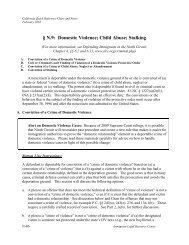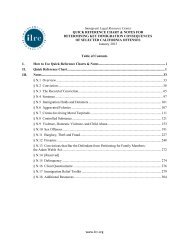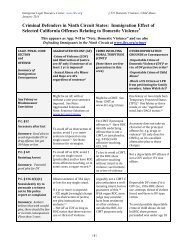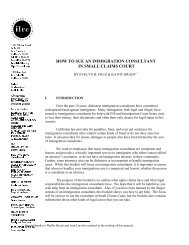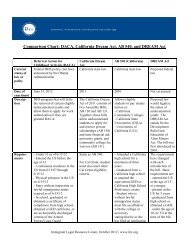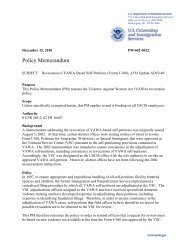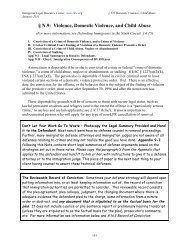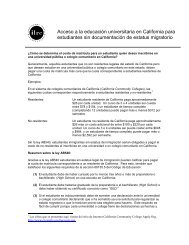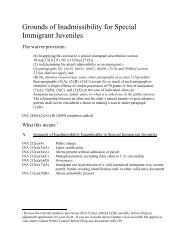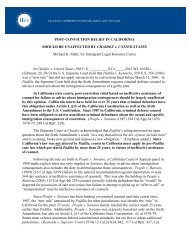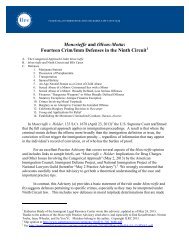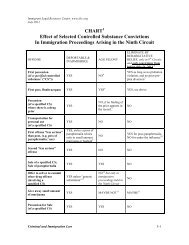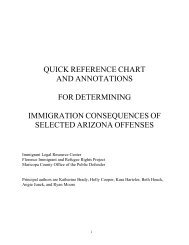quick reference chart and notes for determining immigration - ILRC
quick reference chart and notes for determining immigration - ILRC
quick reference chart and notes for determining immigration - ILRC
Create successful ePaper yourself
Turn your PDF publications into a flip-book with our unique Google optimized e-Paper software.
Cali<strong>for</strong>nia Quick Reference Chart <strong>and</strong> Notes<br />
February 2010<br />
Receipt of stolen property, P.C. § 496(a) is not categorically a crime involving moral turpitude<br />
because it includes intent to temporarily deprive the owner of the property. Castillo-Cruz v.<br />
Holder, 581 F.3d 1154 (9 th Cir. 2009). Where a plea is specifically taken to intent to deprive<br />
temporarily, the question is resolved under the modified categorical approach <strong>and</strong> the<br />
<strong>immigration</strong> judge may not proceed beyond the record under Matter of Silva-Trevino, 24 I&N<br />
Dec. 687, 699 (AG 2008).<br />
F. Safer Pleas <strong>for</strong> Offenses Related to Drugs<br />
See further discussion in § N.7 Controlled Substances<br />
Basic defenses are summarized here, to provide to noncitizen defendants whom you have<br />
represented. However, the best course is to return to § N.8 Controlled Substances, <strong>and</strong> read all<br />
the commentary <strong>and</strong> warnings about pleas in this complex area. See also the Chart <strong>for</strong> drug pleas<br />
that appears at the end of § N.8.<br />
For the Defendant:: If a specific controlled substance is not identified in the record of<br />
conviction or under the terms of the statute, there is no proof that the offense involved a federally<br />
defined controlled substance <strong>and</strong> there are no <strong>immigration</strong> consequences based on a controlled<br />
substance conviction. For example, where the record showed only possession of a “controlled<br />
substance” under Calif. H&S § 11377 with specifying the substance, the Ninth Circuit found that<br />
the person was not deportable. Ruiz-Vidal v. Gonzales, 473 F.3d 1072 (9th Cir. 2007); Matter of<br />
Paulus, 11 I&N Dec. 274 (BIA 1965); Esquivel-Garcia v. Holder, __ 9 th Cir. __ (January 29,<br />
2010) (same <strong>for</strong> Calif. H&S § 11350). The government has the burden of proving that a<br />
specific offense is a controlled substance offense that bars eligibility <strong>for</strong> relief. Esquivel-Garcia.<br />
.<br />
Note on unspecified substance. Advise the defendant that he or she should not admit the<br />
name of the controlled substance to the <strong>immigration</strong> judge, or to anyone else. This might be<br />
termed a <strong>for</strong>mal “admission” of a drug offense, which would make the person inadmissible.<br />
For the Defendant: Accessory after the fact to a drug offense is not a deportable drug<br />
conviction or aggravated felony. Matter of Batista, 21 I&N Dec. 955 (BIA 1997). It is<br />
categorically not a crime involving moral turpitude, meaning that it will not be held to involve<br />
moral turpitude regardless of the fact situation. Navarro-Lopez v. Gonzales, 503 F.3d 1063 (9th<br />
Cir. 2007) (en banc).<br />
Note on accessory: ICE might argue that the moral turpitude finding should be challenged<br />
under Silva-Trevino, or under the Ninth Circuit statement that it will defer to the BIA in moral<br />
turpitude determinations, in Marmolejo-Campos, supra.<br />
Immigrant Legal Resource Center N-137



